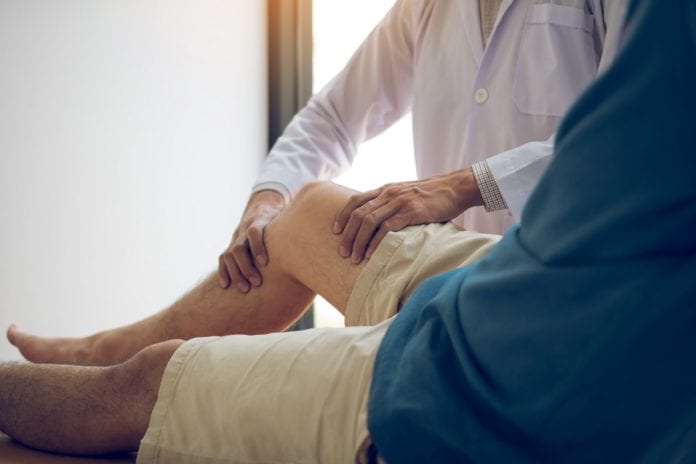 Across Georgia (and most of the country), weekend warriors are suiting up on the basketball court, soccer pitch, baseball diamond or football field. These men and women are enjoying recreational sports – and the warmer temps – with friends and family.
Across Georgia (and most of the country), weekend warriors are suiting up on the basketball court, soccer pitch, baseball diamond or football field. These men and women are enjoying recreational sports – and the warmer temps – with friends and family.
Weekend warriors take their sports very seriously, but also don’t always apply the same intensity and discipline to year-long physical activity. Because of that, they’re more likely to experience an injury, most often because of overdoing it on the field or lack of proper training.
The most common injuries we see among recreational athletes include:
- Broken bones
- Knee pain and problems
- Ligament injuries
- Sprains and strains
Enjoy the game — and all the health benefits team sports has to offer — with a few simple tips to stay injury free.
1. Get Ready for the Season
While it can be tempting to jump into a quick game of basketball or a friendly game of flag football without any training or warm up, you could be headed straight for a serious injury. Recreational sports are supposed to focus on fun, but they should still be taken seriously.
Consider getting ready for an upcoming game or season with a little training. That can be as simple as walking around the block regularly, stretching muscles every day or hitting the gym over the cold winter months. Staying in shape is better for your body: It gets you ready to play your best and can help you prevent injuries when warmer temperatures roll around.
2. Warm Up
There’s a reason you see professional athletes out on the field or court before a game. They – and their coaches and trainers – know the importance of warming up before a game or practice.
Spend time getting your muscles ready for game time. A warmup prepares your body for increased physical activity by raising your temperature and getting the blood flowing to all parts (and muscles) in your body. This helps loosen muscles and can help reduce the risk of injury – including sprains and strains.
3. Listen to Your Body
Let’s just be honest – many of us aren’t exactly spring chickens anymore. As we age, our muscles tighten and our bones start to weaken. This natural aging process is why it’s more important for “older” athletes – even those in their 30s – to stay fit all year long.
It’s also important to listen to your body. Pay attention to your heart rate, breathing and muscles, and learn the difference between what you can push through and when you need to take a break. There’s no shame in knowing your limits. You’ll stay healthy as a result.
4. Stay Hydrated
Water breaks are key for several reasons: Water helps cool your body temperature to keep you from overheating; it replaces water you’re sweating out; and it keeps your muscles and joints lubricated, which can help you prevent injury during the game.
Be sure to drink plenty of water before, during and after your game. One simple way to remember is to fill up a water bottle in the morning and monitor how much you drink throughout the day – including at your game. A good rule of thumb is to take a sip every 30 minutes or so before the game and at every water break during play. Refuel afterward with water or a low-sugar sports drink.
5. Cool Down
A proper cooldown is another easy way to help prevent injury after recreational sports. Cooldowns help lower your heart rate and body temperature safely and prevent blood from pooling in a particular spot.
When the whistle blows, catch your breath by walking a few laps around the field and doing some simple stretches to help you recover.
6. Make Time for Exercise All Week
It’s easy to let exercise slip to the bottom of your to-do list during the work week. Making time for regular physical activity – even as little as 30 minutes three or four days during the week – will help you prevent injury. It will also help boost your performance on the field over the weekend.
Try a few simple strategies to make exercise a priority:
- Ask a family member to join you. Invite your partner for a walk around the neighborhood or ask one of your children to join you on a bike ride. Physical activity is a great opportunity to spend quality time with family and friends.
- Get it out of the way in the morning. An early morning run or workout is a great way to start your day. You’ll also be less likely to find excuses, or get caught up in the hustle and bustle of the day, to skip a workout.
- Schedule it. Block time on your calendar to set aside time for exercise. It will serve as a reminder – and commitment – to the importance of staying fit.
Weekend sports and activities are a great way to stay active and be healthy. Stay in the game by focusing on your health and wellness all week – and year – long.
About Emory Sports Medicine Center
At Emory Sports Medicine Center, our team of specialists is constantly conducting research and developing new techniques for diagnosing and treating the full range of sports-related injuries. Whether you are a professional athlete or simply enjoy an active lifestyle, Emory provides comprehensive care in a patient–family-centered environment so together we achieve the best possible outcome and you can return to the sport you love.
About Dr. Hammond
 A native to our community, Kyle Hammond, MD, has a passion for treating adult and youth sports injuries. In addition to seeing patients at the Brookhaven, Johns Creek and Smyrna locations of Emory Orthopaedics & Spine Center, he serves as the head orthopaedic surgeon for the Atlanta Hawks. He also serves as an associate team physician for the Atlanta Falcons, Atlanta Braves, Georgia Tech, Emory University, and several metro Atlanta high schools. And, Dr. Hammond has been awarded the highest recognition from Emory for patient satisfaction scores in each of his years in practice.
A native to our community, Kyle Hammond, MD, has a passion for treating adult and youth sports injuries. In addition to seeing patients at the Brookhaven, Johns Creek and Smyrna locations of Emory Orthopaedics & Spine Center, he serves as the head orthopaedic surgeon for the Atlanta Hawks. He also serves as an associate team physician for the Atlanta Falcons, Atlanta Braves, Georgia Tech, Emory University, and several metro Atlanta high schools. And, Dr. Hammond has been awarded the highest recognition from Emory for patient satisfaction scores in each of his years in practice.



